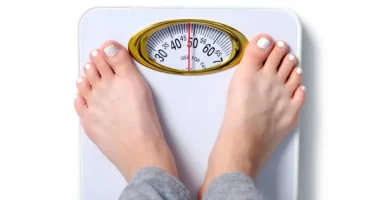Find out “How Does Weight Loss Calculator Serve You” Weight loss calculators are online tools that help you estimate how many calories you need to consume each day to maintain, gain, or lose weight. They typically take into account factors such as your age, sex, height, weight, and activity level.
How Do Weight Loss Calculators Work?
Weight loss calculators use a variety of formulas to estimate your daily calorie needs. One common formula is the Harris-Benedict equation, which was developed in the early 1900s. This formula takes into account your age, sex, height, and weight to estimate your basal metabolic rate (BMR), which is the number of calories your body burns at rest. The calculator then adds a factor based on your activity level to estimate your total daily calorie needs.
How Can Weight Loss Calculators Help You Lose Weight?
Weight loss calculators can help you lose weight by helping you create a calorie deficit. To lose weight, you need to consume fewer calories than you burn each day. A calorie deficit can be created by reducing your calorie intake, increasing your physical activity, or both.
Weight loss calculators can also help you set realistic weight loss goals. A safe and sustainable rate of weight loss is 1-2 pounds per week. This rate can be achieved by creating a calorie deficit of 500-1000 calories per day.
What Are the Limitations of Weight Loss Calculators?
Weight loss calculators are not perfect. They can only provide an estimate of your calorie needs. Your actual calorie needs may be higher or lower than what the calculator estimates. Additionally, weight loss calculators do not take into account individual factors such as genetics, metabolism, and body composition.
How to Use a Weight Loss Calculator
To use a weight loss calculator, you will need to enter some basic information about yourself, including your age, sex, height, weight, and activity level. Once you have entered this information, the calculator will estimate your daily calorie needs. You can then use this information to create a meal plan that will help you reach your weight loss goals.
Here are some additional tips for using a weight loss calculator:
- Use a reputable weight loss calculator from a trusted source.
- Enter your information accurately.
- Be realistic about your weight loss goals.
- Use the calculator as a starting point and adjust your calorie intake as needed.
- Talk to your doctor or a registered dietitian for personalized advice.
Here’s a sample weight loss calculator table:
| Gender | Age | Height (cm) | Weight (kg) | Activity Level | BMR (calories per day) | TDEE (calories per day) | Recommended Daily Calorie Intake |
|---|---|---|---|---|---|---|---|
| Female | 30 | 165 | 65 | Sedentary | 1,325 | 1,630 | 1,130-1,525 |
| Male | 35 | 175 | 80 | Lightly Active | 1,725 | 2,025 | 1,500-1,900 |
| Female | 40 | 180 | 75 | Moderately Active | 1,850 | 2,200 | 1,650-2,100 |
| Male | 45 | 190 | 90 | Very Active | 2,035 | 2,475 | 1,900-2,300 |
| Female | 50 | 170 | 60 | Extremely Active | 2,150 | 2,625 | 1,950-2,450 |
| Male | 55 | 185 | 100 | Very Active | 2,390 | 2,925 | 2,200-2,600 |
| Female | 60 | 160 | 55 | Lightly Active | 1,515 | 1,810 | 1,300-1,700 |
| Male | 65 | 175 | 95 | Moderately Active | 2,080 | 2,525 | 1,950-2,350 |
| Female | 70 | 155 | 50 | Sedentary | 1,235 | 1,530 | 1,030-1,425 |
| Male | 75 | 165 | 85 | Lightly Active | 1,865 | 2,210 | 1,650-2,050 |
- BMR (Basal Metabolic Rate) is the number of calories your body burns at rest to maintain its basic functions.
- TDEE (Total Daily Energy Expenditure) is the total number of calories you burn each day, including your BMR, activity level, and the thermic effect of food (TEF).
- Recommended Daily Calorie Intake is the range of calories you should consume each day to lose 1-2 pounds per week.
This is just a sample table, and your individual calorie needs may vary. It is always best to consult with a doctor or registered dietitian to determine your specific calorie needs.
RELATED: How to burn 1000 calories in 30 minutes to one hour – 8 Easy ways
Key Benefits Of Using a Weight Loss Calculator
- Estimating Daily Calorie Needs: Weight loss calculators help you determine your daily calorie needs based on factors such as your age, gender, weight, height, and activity level. This information is essential for creating a calorie deficit, which is necessary for losing weight.
- Setting Realistic Goals: Weight loss calculators can assist you in setting realistic and achievable weight loss goals. They can help you determine how much weight you can expect to lose within a specific timeframe, taking into account your calorie deficit and other factors.
- Tracking Progress: You can use a weight loss calculator to track your progress over time. By entering your current weight and other relevant information regularly, you can see how your weight is changing and whether you’re on track to reach your goals.
- Adjusting Calorie Intake: Weight loss calculators allow you to adjust your daily calorie intake as you progress. If you’re not losing weight as expected, you can recalculate your calorie needs and make appropriate adjustments to your diet and exercise routine.
- Planning Meals and Exercise: These calculators can help you plan your meals and exercise regimen by providing recommendations for daily calorie intake and the number of calories you should aim to burn through physical activity.
- Motivation and Accountability: By using a weight loss calculator, you can stay motivated and accountable for your weight loss journey. It provides a clear and quantifiable way to measure your progress and see the impact of your efforts.
- Education and Awareness: Weight loss calculators can help you better understand the relationship between calorie intake, calorie expenditure, and weight loss. This knowledge can be valuable for making informed decisions about your diet and exercise.
- Customization: Many weight loss calculators can be customized to fit your specific goals and preferences. They can provide recommendations for different diet plans, such as low-carb, low-fat, or balanced diets, depending on your needs and preferences.
Conclusion
Weight loss calculators can be a helpful tool for people who are trying to lose weight. However, it is important to remember that they are not perfect and should be used as a starting point. Talk to your doctor or a registered dietitian for personalized advice on how to lose weight safely and effectively.









